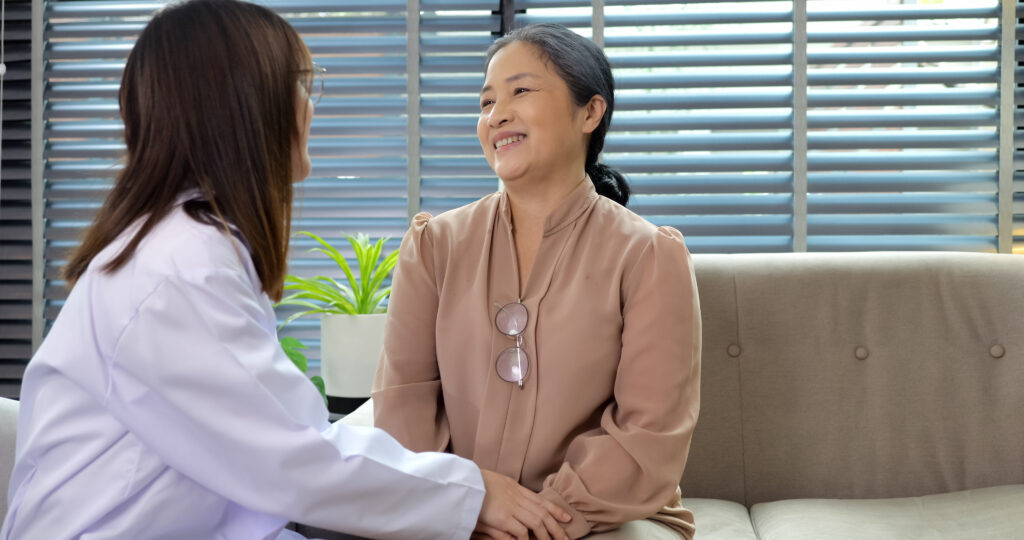
We all know women who are 40-60 years old or in the hormonal transitional phase known as menopause. They are experiencing the effects it has on day-to-day life, ranging from mood changes, aches and pains, and even heart palpitations. What most women don’t realize is that, during their monthly cycles, they go through the rise and fall of estrogen or progesterone for a good 30 years of their lives, relying on the rhythm of these hormones.
What Causes Menopause Symptoms?
Menopause symptoms are the result of the decrease in estrogen and progesterone. However, estrogen does not take a gradual decline like testosterone does in men; it is a dramatic plummet, a cliff drop. The estrogen and progesterone tank. It goes from having some to nothing, sending a shock wave of menopause symptoms throughout the organ systems, ranging from the heart, mood, bones, skin, temperature regulation, and every corner.
How Menopause Affects Your Body: Organ Changes
It can be confusing to figure out which symptoms should be blamed on menopause and which have another reason. Keep in mind, some medications can cause menopause symptoms that you may think are related to menopause, so we do want to flesh these out. For example, some medications strip your tissues of collagen, contributing to symptoms in our softer tissues, like skin changes, pain in connective tissue, and muscles. Others can affect our mood, hoarse voice, palpitations, and so forth.
Another diagnosis may also be responsible for heart palpitations, anxiety, or other symptoms. It is often best to be assessed for menopause symptoms and rule out any other compounding diagnoses. However, many women just do not realize that so many of their symptoms, such as headaches, muscle pain, mood changes, and bladder problems, can be signs of menopause. And they may feel brushed off when discussing this with their doctor. They will likely resolve after menopause; however, menopause can last 5-11 years, and that is a long time to suffer.
The Ripple Effect: Every System is Impacted
Some hormonal changes are related to the reproductive organs, but most are related to our day-to-day survival, including energy, sleep, mood, elasticity of tissues, etc. All the organ systems are affected by the hormonal disruptions. Skin can lose its elasticity and may need to help detox more than usual, developing rashes or acne. The bones suffer from the shift, and while we naturally lose some bone during menopause, we try to prevent the excessive loss that can lead to osteoporosis.
That poor liver, which is often overtaxed anyway, now has to do even more recycling of hormones while this transition takes place. The ovaries take a backseat while the adrenal glands have to pick up the slack, already working overtime producing stress hormones for a woman likely still caring for kids at home and aging parents. Adipose or fat tissue will get recruited in an attempt to help make estrogen that the ovaries no longer make, which means a harder time losing weight and those notorious love handles.
Estrogen plays a large role in brain function and memory, which is why menopausal women feel some cognitive decline during these years. Muscles and other soft tissue (think vaginal tissue) lose their elasticity during the estrogen drop, which can cause tightness, headaches, or the common frozen shoulder, as well as vaginal dryness. Progesterone drops will make an impact on sleep, sense of well-being, and frankly, just peace. Anxiety can be on the rise without the soothing progesterone.
The Mental and Emotional Transition of Menopause
Essentially, the time from perimenopause to postmenopause is one of hormone deficiency, a huge shift from what the body is used to having available. The brain is not excluded from the downstream effects of the hormonal drop. Neurotransmitters may not have enough building blocks or may have too many and can create swings of irritability, depression, and anxiety, or at least more than normal. There is a mental-emotional shift going on here as well. Instead of being the protector, gatherer, and harvester with strength and courage doing menial labor with risks, you become more of the storyteller, a gentler position with less struggle and more sharing of your experience.
Embracing Self-Care During Menopause
Changing from caretaker or worker bee to more of a queen bee with a focus on who you are and what you can teach or offer. This does seem to go against culture since the female gender is challenged with the care of all those around her. This doesn’t mean we won’t continue to do some phase of caring for others in our day-to-day life.
However, this transition allows you to stop living for others and their emotions or needs; take the mask off; and be who you truly are and find your needs. This is typically called self-care. Time to focus on care of your mind, soul, and body; taking time to prioritize daily the steps to make this happen. Many menopausal women are more likely to encourage those in their care to fend for themselves. They may find themselves telling others to make their own meals or do their own laundry. This is a healthy transition to care of self.
How to Live Better During Menopause
Treating menopause is usually not as simple as addressing one concern, although in a rare few, it can happen. Most women need a well-rounded plan to treat their whole person. Addressing mood, energy, and physical symptoms are all part of the strategy. They will often notice a cause and effect from their lifestyle choices, such as if they drink a glass of wine, they may have more intense menopause symptoms, and these are always important notes for the individual. Weight loss is often the biggest concern, so let’s talk about that here, with hormone replacement therapy being the most confusing treatment, so let’s chat about that as well.
Menopause Weight Gain: Why It Happens and What You Can Do
Weight loss is very concerning for women, and it can become an obsession with how to get the weight off. As mentioned above, the adipose tissue or extra weight gets summoned to help produce estrogen as the production of estrogen falls. It is a protective mechanism, and we can fall into body shaming or comparison to what culture says we should look like. As we shift our focus to improving mood, sleep, energy, and how you can feel best in your body, we can find the balance. Shifting focus to more muscle building and strength training can help offset the tendency for adipose tissue rather than hiking, walking, cycling, and other cardio activities.
Making muscle during strength training, balanced with leaving enough time for restorative movement like yoga, will improve testosterone, which in turn improves DHEA and energy. Testosterone, DHEA, and the like compete against excess adipose or fat tissue. Also, most women need waaaaay more sleep than they are getting. Sleep improves DHEA, stress hormones, and so it works as another competition to fat cells. Believe it or not, sleep means less weight gain.
Hormone Replacement Therapy: Separating Facts from Fears
Estrogen and progesterone therapy, also known as hormone replacement therapy, has had its controversy, and if health care providers cannot seem to make sense of what the research is telling us about the relationship of estrogen with breast cancer, imagine the confusion and fear that women going through menopause experience. It is chaotic! Is it an option? Will it work? Am I more likely to get cancer? Hormone replacement therapy is one of the most effective treatments for all menopausal symptoms, from hot flashes and night sweats to heart palpitations and joint pain.
Does Estrogen Cause Breast Cancer? The Truth About HRT
So, understanding if and when there is a relationship to cancer is important for women seeking treatment options for menopause. To be clear, Estrogen does not cause breast cancer. The confusion comes from a premature media release on the Health Initiative Study before it was even published. Not only was the connection of estrogen treatment and breast cancer not statistically significant, but it was also done in an older population, not a menopausal population.
The news announcement was premature, unpublished data; and the placebo comparison group had received estrogen previously, making the results even more confusing. They ended up having a lower risk of developing breast cancer when compared to those taking estrogen in the study, which made it look like those on estrogen had a higher risk. There were many misunderstandings, and the study was too expensive to repeat. Based on the incidence rates, smoking clearly increases the risk of breast cancer. Antibiotic use over 1000 days, night shift work, and electric blanket use even have a higher risk for breast cancer than estrogen, and imagine the even lower risk with a balanced hormone replacement protocol for the individual.
The Benefits of Hormone Replacement Therapy
A premature press release really created a lot of confusion, fear, and prevented patients from getting the type of help that would have improved the quality of life for them during their menopause transition. Our lesson here is to wait until the research is peer reviewed and published, as well as estrogen does not cause cancer. We do know that bioidentical hormones have a tighter connection to our tissues and work even better than synthetic ones. On top of feeling better during menopause, it lowers the risks of heart disease, dementia, osteoporosis, and more.
The incidence of death from heart disease is greater than the incidence of death from breast cancer, and knowing how to take care of your heart should be a part of every patient’s care plan. Heart disease causes more deaths in every age of women than the next 16 causes of death combined, including all cancers! We also see that it helps to protect the brain from dementia, and it is the only preventative treatment for Alzheimer’s. The only negative risk factor we are seeing with estrogen is the increased risk of endometrial cancer if risk factors such as family history are present.
Finding Hope and Strength Through Menopause
Many women suffer from the symptoms of menopause. Not sleeping for seven years is intense. Hormone replacement is definitely an option, and we can do more harm to women by not educating them and encouraging hormone replacement therapy as an opportunity to feel better and protect the heart and brain for the future. There should be a choice without the fears, inflated by the media. If hormones are not chosen, there are still many botanicals that can help with menopausal symptoms effectively.
The transition of menopause can create a huge ordeal in a woman’s life, causing a lot of adaptation, and even those around her have to learn how to adapt to the shift! Understanding and knowing your resources may help bring hope and dispel some fears, as well as find their strength and wisdom to share with their world.
At Journey of Health, we create personalized treatment plans that address your unique symptoms and goals. Whether you’re considering hormone replacement therapy or exploring natural alternatives, our team is here to guide you every step of the way. Schedule your consultation today and discover how good you can feel!



Speak Your Mind